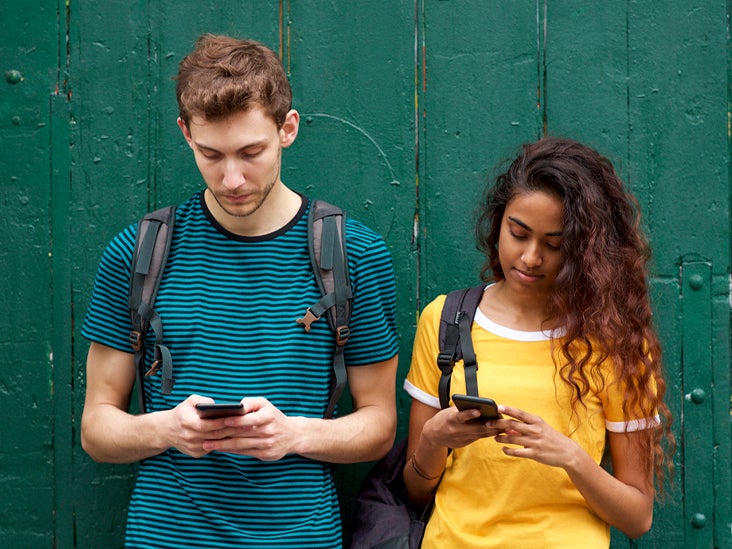
- A former Facebook employee testified to Congress this week that the company’s social media platforms are dangerous for children.
- According to reports, internal research found that Instagram often led to feelings of depression and anxiety for some teens.
- Behavioral health specialists say parents don’t need to ban their kids from using social media altogether, but it’s worth setting rules and limits about how to engage with the platforms.
Earlier this week, a former Facebook employee made headlines when she testified to Congress that the company’s social media platforms are dangerous for children.
Young people are often targeted with content that includes toxic messaging about body image, and many of them fall victim to cyberbullying.
On one hand, these platforms have given kids the space to connect to others with shared interests and find resources for mental health.
According to press reports, a survey conducted by Facebook found that approximately 13.5 percent of teenage girls said the platform worsened suicidal thoughts, and 17 percent said it contributed to an eating disorder.
Other research published in 2020 found that social media can have both positive and negative effects on children.
Experts say there’s also a well-established link between social media and cyber-bullying, depression, anxiety, and suicide among young people.
For parents trying to decide how to protect their kids, experts say they don’t need to ban their kids from using social media altogether, but it’s worth setting rules and limits about how to engage with the platforms.
Parents should regularly check in with their kids about their social media experiences and keep an eye out for any changes in their mood, sleep, or eating habits.
Jessica Castonguay, DO, MPH, an adolescent medicine specialist and medical director of the eating disorders program at Akron Children’s Hospital, said concerns about body shape and size are common amongst adolescents and typically start during puberty — a time when many kids join social media.
“The added stimulus of frequent images of ‘ideal’ body shape can lead to increased body image concerns among tweens and teens,” Castonguay said.
While social media has its benefits, repeated exposure to harmful content on the platforms can create feelings of inadequacy and lead to anxiety and depression.
“Individuals with specific temperaments or psychiatric conditions may be more likely to experience the negative effects of social media exposure, regardless of how much time they spend ‘doomscrolling,’” said Dr. Leela R. Magavi, a psychiatrist and regional medical director for Community Psychiatry and MindPath Care Centers.
While some kids can tolerate more time on social media, some children are negatively affected within as little as 5 minutes, Magavi explained.
According to Dr. Jennifer Weber, the director of behavioral health at PM Pediatrics Behavioral Health, it’s not realistic to ban your children from using social media altogether.
“That really is not even in their best interests, as the world demands knowledge of these platforms for social and career communication as well as full engagement in current events,” Weber said.
But their usage can be regulated, and children can be taught to use social media responsibly, she said.
“It is important to individualize time limits based on each child’s story,” Magavi said.
For example:
- Set rules and boundaries about how your children should use social media. Castonguay suggested avoiding screens during dinner time and 1 hour before bedtime.
- You may also want to download an app on your kids’ devices that sets limits on social media usage per day. The American Academy of Pediatrics recommends no more than 2 hours of screen time a day.
- Limit social media use to waking hours only, which helps minimize the time your kids are on social media unsupervised.
- Have a central location where all phones can charge at night.
Weber advised parents to practice these rules themselves, so kids can learn from example.
Check in with your kids about their experiences on social media.
“Ask them about which platforms they spend the most time on and make it clear you are open to them sending you things they find interesting or entertaining,” Weber said.
Encourage your kids to seek out reliable information sources and avoid accounts that promote unhealthy advice or extreme body standards, Castonguay advised.
“Model a healthy self-image. Encourage acceptance of different body types,” Castonguay said.
Look out for changes in their moods, withdrawal from activities they enjoy, and changes in sleep or eating habits. If the changes become drastic or begin impacting their quality of life, see a doctor.
A former Facebook employee testified to Congress this week that the company’s social media platforms are dangerous for children, often leading to feelings of depression and anxiety.
Behavioral health specialists say parents don’t need to ban their kids from using social media altogether, but it’s worth setting rules and limits about how to engage with the platforms.
Parents should regularly check in with their kids about their social media experiences and keep an eye out for any changes in their mood, sleep, or eating habits.
"social" - Google News
October 09, 2021 at 07:29PM
https://ift.tt/3mGEnVE
After Facebook Bombshells, Should Parents Keep Kids Off Social Media? - Healthline
"social" - Google News
https://ift.tt/38fmaXp
https://ift.tt/2WhuDnP
Bagikan Berita Ini














0 Response to "After Facebook Bombshells, Should Parents Keep Kids Off Social Media? - Healthline"
Post a Comment